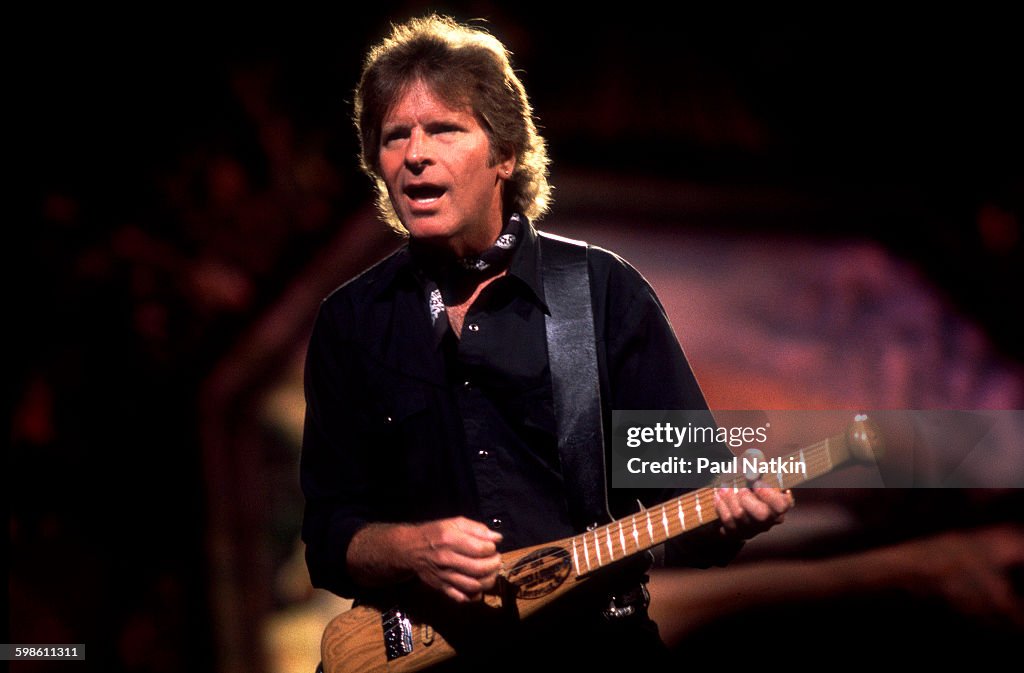
“Hearts of Stone” is a sweet-sounding warning wrapped in a sing-along groove—a song that smiles as it tells you the hardest truth: some hearts simply won’t soften, no matter how gently you knock.
When John Fogerty released “Hearts of Stone” in 1973, he did it under an alias that felt like a veil and a fresh start: The Blue Ridge Rangers—a “band” that was, in reality, Fogerty alone. The single became a real, measurable hit in its own right, peaking at No. 37 on the Billboard Hot 100, a modest but meaningful climb for a record that wasn’t trading on the full glare of his Creedence Clearwater Revival fame.
That chart fact matters, but the story behind it matters even more. After CCR dissolved, Fogerty didn’t rush to prove he could outshout his past. Instead, he turned inward—toward the country, gospel, and old American songbook that had always been in his bloodstream. His debut solo album, released in April 1973, was credited to The Blue Ridge Rangers with no mention of him on the cover, a deliberate decision meant to create distance from the Creedence legacy. On the record, he played all the instruments himself, producing it as a one-man band with a craftsman’s patience.
In that setting, “Hearts of Stone” feels like a perfect choice: familiar, rooted, almost archetypal—yet given a new skin by an artist rebuilding his identity from the ground up.
Because Fogerty wasn’t writing “Hearts of Stone.” He was reaching back to a song with its own long shadow. “Hearts of Stone” was written by Eddie Ray and Rudy Jackson, first recorded in 1954 by the West Coast R&B group the Jewels, and then turned into a major hit in 1954 by Otis Williams & the Charms (whose version hit No. 1 on the R&B Best Sellers chart and crossed to the pop charts). Later, the tune became a pop phenomenon again when the Fontane Sisters took it to No. 1 in the mid-1950s.
So when Fogerty tackled it in 1973, he wasn’t just choosing a “good old song.” He was stepping into a river of American music history—and doing something sly with it. His version keeps the classic moral sting intact: the idea that emotional hardness is not strength, it’s a kind of poverty. The lyric’s central image—hearts made of stone—is devastating because it sounds so final. Stone doesn’t bruise; it doesn’t bend; it doesn’t apologize. And if you’ve ever tried to love someone who couldn’t (or wouldn’t) meet you halfway, you already understand the ache behind the rhythm: you can pour your devotion into that stone forever, and still it won’t warm.
What makes Fogerty’s performance linger is the way it refuses to wallow. There’s a bright, rockabilly snap to his delivery—almost like a Sun Records daydream—so the song moves forward even as the lyric admits defeat. Some writers have noted that Fogerty reportedly wanted to write something in this style first, then ultimately chose to record the original and shape it until it sounded like it belonged to his own instincts. That’s the artistry: he doesn’t modernize the song with trendy polish; he re-centers it in an older American pulse—tight groove, clean lines, and that unmistakable Fogerty bite.
The single’s details underline how carefully he positioned it. “Hearts of Stone” was issued on Fantasy (catalog Fantasy 700), backed with “Somewhere Listening (For My Name)”, and sources describe its release window as April 1973. That timing matters: this was Fogerty, newly solo, letting the world hear him without the CCR name—yet still unmistakably himself, still able to turn three minutes into something that feels lived-in.
And then there’s the emotional symbolism of the whole Blue Ridge Rangers chapter. This was Fogerty choosing humility on purpose—choosing tradition, choosing craft, choosing the pleasure of making a record with his hands. The Blue Ridge Rangers album itself reached No. 47 on the charts, and its two best-known singles—“Jambalaya (On the Bayou)” and “Hearts of Stone”—proved he could still reach the public even while sidestepping the expected storyline.
In that light, “Hearts of Stone” becomes more than a cover. It becomes a kind of self-portrait—an artist refusing to harden. The song warns against stone-heartedness, yes, but its existence is proof of the opposite: here is Fogerty, newly bruised by band breakups and industry strain, still choosing music that connects rather than isolates. He sings about emotional unreachability, yet he offers the listener something profoundly reachable: a melody you can hold, a rhythm you can trust, and a truth spoken plainly.
That’s why the record still feels good to put on. It’s not a grand, myth-making anthem—it’s something older and, in its way, wiser: a reminder that love can’t be forced, that some doors won’t open, and that sometimes the healthiest goodbye is the one you sing while you’re still strong enough to sing at all.